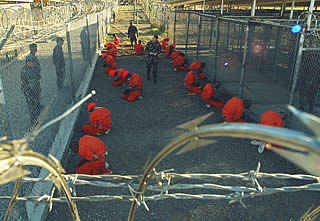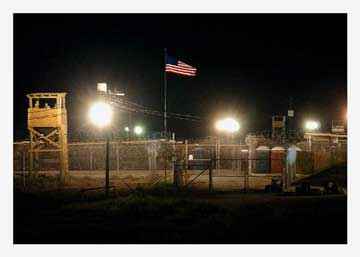|
Camp X-RayAll those years of experience running secret civilian death camps on U.S. soil are finally paying off! After September 11 Camp X-Ray took the Amerikan Dream public. And, unsurprisingly, no one really seemed to mind.After the U.S. invaded Afghanistan to find and punish al Qaeda for the disastrous 9/11 attack on America, the government found itself with a lot of prisoners on its hands. Secretary of Defense Donald Rumsfeld quickly discarded the notion of complying with American ideals of due process and international laws such as the Geneva Conventions. According the Bush administration's rationale, terrorists are "unlawful combatants," which you can read as "non-entities."
Why Cuba? By holding the prisoners there, the military evaded the legal requirements for the treatment of prisoners that U.S. law demands from any operation taking place within its jurisdiction. The military wasted no time in taking full advantage of these new freedoms. From the moment a prisoner arrives at Camp X-Ray, he starts enjoying a visceral imprisonment experience that makes Alcatraz look like Bermuda. First, of course, they have to be "arrested." An account of an Afghanistan arrest given to Amnesty International goes like this: Allah Noor, 40, was quoted as saying "They were beating us on the head and back and ribs. They were punching us with fists, kicking me with their feet. They said: 'You are a terrorist! You are al-Qa'ida! You are Taleban!'" Abdul Rauf, aged between 60 and 65, reportedly said: "I was down on my knees, bent over, and they kicked me in the chest. I heard my ribs crack. Then I was lying on my side and they kicked me in the back, in the kidneys and I fainted."
In the beginning, the open-air accommodations were apparently also all about well-being. Each barbed-wire construct was a spacious 6-foot-8-inches by 8 feet, allowing prisoners the luxury of lying down in at least one direction. Each came with a fully functional bucket for toilet needs. After it became Camp X-Ray was not so much about temporary detention as about lifetime imprisonment without charge, a new facility was built with humane improvements like flushable toilets (but with smaller cells). According to reports in British newspapers (as opposed to American newspapers, which are just trying to forget the place exists), more than 30 inmates have tried to commit suicide, driven to pathetic lengths such as trying to slit their wrists with plastic spoons.
According to a formal Amnesty International complaint about the camp, the U.S. government has:
Once it became clear to the government that the U.S. media was prepared to look the other way as far as Camp X-Ray's conditions and the, shall we say, "uninhibited" process under which its residents are selected, apprehended and transported, the outstanding question then becomes: How long is this going to go on? Amnesty International, in particular, would like to know the answer to that question. Defense Department officials have indicated that the detention of prisoners at Camp X-Ray is "indefinite." Further color was provided by Secretary of Defense Rumsfeld, who said that he felt it was "reasonable" to hold the prisoners for the "duration of the conflict," with the conflict in question being the War on Terrorism. Since terrorism isn't likely to be vanquished any time in the foreseeable future, one can safely presume the "conflict" could extend well past the probable lifespan of either the prisoners or their captors. In other words, check back here for an update in about 2050.
|
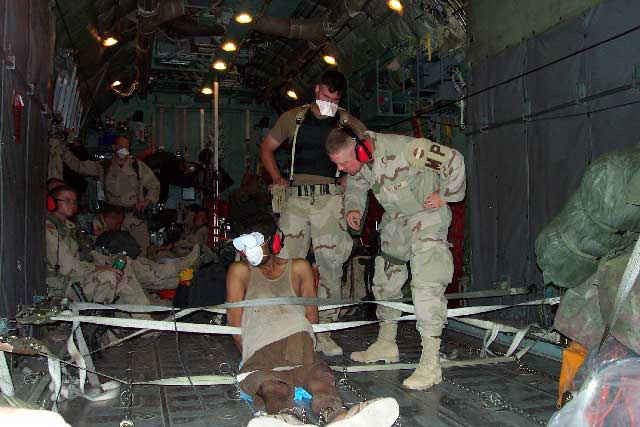
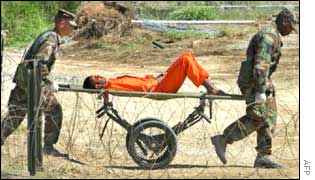 After arrest, prisoners come to the camp restrained by a series of safeguards previously only used on visitors to the
After arrest, prisoners come to the camp restrained by a series of safeguards previously only used on visitors to the 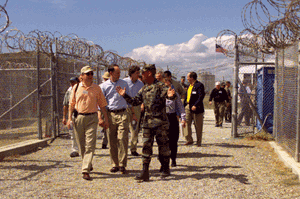
 Camp X-Ray residents get three "culturally sensitive" meals a day. Some are allowed to exercise and write letters under close supervision.
Camp X-Ray residents get three "culturally sensitive" meals a day. Some are allowed to exercise and write letters under close supervision. 